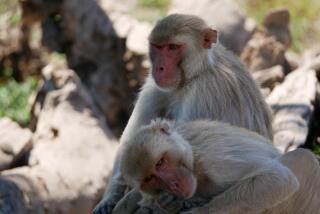Some Birds Can Control Babies’ Sex, Study Says
- Share via
NEW YORK — A small brown bird in the island nation of Seychelles has provided the first experimental evidence that some wild animals can control the sex of their offspring.
After four pairs of Seychelles warblers were moved from an area where food was sparse to spots where it was plentiful, their ratio of male to female offspring changed dramatically. Sons outnumbered daughters 18 to 2 in the sparse-food environment, but sons lost out 5 to 29 when more food was available.
Daughters stick around the nest and help parents with tasks like defending territory and feeding the young. So daughters are useful when there’s enough food around. But when food is sparse, daughters become a source of competition for it.
So it makes sense that parents might adjust the sex ratio of their offspring in response to the availability of food, Jan Komdeur of the University of Melbourne in Australia and colleagues in Europe say in their report in the Feb. 6 issue of the journal Nature.
But nobody knows how the birds alter the sex ratios, Komdeur said.
Evolutionary theory has long predicted that animal parents should control that ratio, and support has been found in observations of some insects. But few studies have found sex ratios in birds that fit predictions, Patricia Gowaty of the University of Georgia wrote in a Nature commentary.
Komdeur’s study is “an instant classic” because it’s the first experimental demonstration of the effect in the wild, she said.
More to Read
Sign up for Essential California
The most important California stories and recommendations in your inbox every morning.
You may occasionally receive promotional content from the Los Angeles Times.









